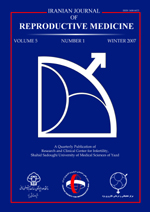
|
International Journal of Reproductive BioMedicine
Research and Clinical Center for Infertility, Shahid Sadoughi University of Medical Sciences of Yazd
ISSN: 1680-6433
EISSN: 1680-6433
Vol. 13, No. 5, 2015, pp. 305-310
|
 Bioline Code: rm15043
Bioline Code: rm15043
Full paper language: English
Document type: Research Article
Document available free of charge
|
|
|
International Journal of Reproductive BioMedicine, Vol. 13, No. 5, 2015, pp. 305-310
| en |
Association of androgen receptor GGN repeat length polymorphism and male infertility in Khuzestan, Iran
Moghadam, Mohamad; Khatami, Saied Reza & Galehdari, Hamid
Abstract
Background: Androgens play critical role in secondary sexual and male gonads differentiations such as spermatogenesis, via androgen receptor. The human androgen receptor (AR) encoding gene contains two regions with three nucleotide polymorphic repeats (CAG and GGN) in the first exon. Unlike the CAG repeats, the GGN has been less studied because of technical difficulties, so the functional role of these polymorphic repeats is still unclear.
Objective: The goal of this study was to investigate any relationship between GGN repeat length in the first exon of AR gene and idiopathic male infertility in southwest of Iran.
Materials and Methods: This is the first study on GGN repeat of AR gene in infertile male in Khuzestan, Iran. We used polymerase chain reaction (PCR) and polyacrylamide gel electrophoresis to categorize GGN repeat lengths in 72 infertile and 72 fertile men. Afterwards we sequenced the PCR products to determine the exact length of GGN repeat in each category. Our samples included 36 azoospermic and 36 oligozoospermic men as cases and 72 fertile men as control group.
Results: We found that the numbers of repeats in the cases range from 18 to 25, while in the controls this range is from 20 to 28. The results showed a significant relation between the length of GGN repeat and fertility (p=0.015). The most frequent alleles were alleles with 24 and 25 repeats respectively in case and control groups. On the other hand no significant differences were found between Arab and non-Arab cases by considering GGN repeat lengths (p=0.234).
Conclusion: Due to our results, there is a significant association between the presence of allele with 24 repeats and susceptibility to male infertility. Therefore this polymorphism should be considered in future studies to clarify etiology of disorders related to androgen receptor activity.
Keywords
Androgen receptor; GGN repeat; Male infertility; Khuzestan
|
| |
© Copyright 2015 - Iranian Journal of Reproductive Medicine
Alternative site location: http://www.ijrm.ir
|
|
